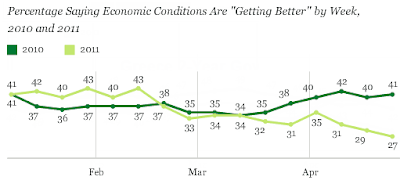Mish's Global Economic Trend Analysis |
| Property Taxes: an ATM for the Government; Measure to Abolish Property Taxes Approved for ND Ballot Posted: 30 Apr 2011 05:19 PM PDT Congratulations to citizens of North Dakota, fed up with taxation and have raised the necessary number of signatures to place a measure abolishing property taxes on the ballot. The voter initiative needed 27,000 signatures. 28,000 signed the petition. Please consider Measure to abolish North Dakota property taxes on ballot Secretary of State Al Jaeger said Friday the initiative had enough petition signatures to qualify for the June 2012 primary election. It will be listed as Measure 2.Property Taxes, an ATM for the Government  The above image courtesy of Empower The Taxpayer which asks "Why Should Your Home Be Governments' Private ATM?" Please click on the above link for more information including an FAQ, explaining what the measure is all about and how you can help. The real battle begins now. No doubt recipients of the tax and supporters of "big government" will battle Measure 2 furiously. Mike "Mish" Shedlock http://globaleconomicanalysis.blogspot.com Click Here To Scroll Thru My Recent Post List |
| Governor Brown Tells Cheering California Unions "You've Got a Friend" Posted: 30 Apr 2011 12:31 AM PDT As payback to the teachers', police, prison, and firefighters' unions largely responsible for his election, socialist Governor Jerry Brown vows to pick the pockets of California taxpayers, and tells cheering unions "You've Got a Friend". Bloomberg reports, Brown May Take $11 Billion California Tax Extension to Voters California Governor Jerry Brown said he's willing to gather signatures for a voter initiative to extend $11 billion in expiring tax increases, blocked by Republican lawmakers, in order to balance the state's budget.Unions Hurt Kids Cuts won't hurt kids, but unions sure do. Via tactics of coercion, bribery, and threats, unions have achieved enormous power for their own self-serving mission, to the detriment of everyone but the politicians whose votes they buy. Here are a couple of YouTube videos to consider. I could easily come up with dozens more. Give up the Bucks Link if the above video does not play: Give Up the Bucks SEIU Spokesperson Threatening California Lawmakers with Union Retaliation Link if the above video does not play: SEIU Retaliation As I have pointed out many times, union rules prevent firing of horrendous teachers, act to block charter schools and home teaching, and union seniority rules hurt the neediest schools the most. Not a single teacher need lose their job if there are cuts. All that needs to happen is for public service pay and benefits to be brought in line with that of the private sector. Instead, Brown wants to hike taxes, including sales taxes and reduce child credits. Some of his proposed measures will fall disproportionally on those who can least afford it. In effect, socialist Brown wants to rob everyone for the benefits of overpaid, underworked, and over-pampered unions who already receive pay, benefits, and job guarantees that make most in the private sector envious. Brown is no friend of California. Mike "Mish" Shedlock http://globaleconomicanalysis.blogspot.com Click Here To Scroll Thru My Recent Post List |
| You are subscribed to email updates from Mish's Global Economic Trend Analysis To stop receiving these emails, you may unsubscribe now. | Email delivery powered by Google |
| Google Inc., 20 West Kinzie, Chicago IL USA 60610 | |


















